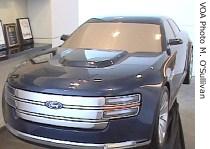The U.S. auto industry is based in Detroit, and
auto manufacturing is done in the Midwest and elsewhere. But California, with
its endless freeways, is the center of car culture. Mike O'Sullivan reports, it
is also a center for advanced auto design, where vehicles of the future are
taking shape.
Californians love their cars, as they have since
the automobile was introduced more than a century ago.
Today the region is home to more than a dozen design shops where new concepts
are explored. The Mazda Miata, Honda CRX, and Toyota Celica were all conceived
here.
Some designers are trained at the Art Center College of Design in Pasadena.
Its graduates
work for more than a dozen companies with advanced design
shops in the region.
Auto designer Stewart Reed chairs the Art Center's
transportation department.
"It's an extremely vibrant marketplace of both products and ideas," said Mr.
Reed. "It's a center of arts and architecture and entertainment and high
technology, so it's a great place to have a design school."
Art Center graduate Franz Von Holzhausen heads Mazda's North American design
center in the city of Irvine. The company sums up its marketing approach in the
motto "zoom zoom."
"'Zoom zoom' is really a personal feeling, and for me,
my feeling of 'zoom zoom' is the emotion of motion, and it's really that kind of
exuberance you get when you're a little kid of just getting out there and having
fun," he said.
He says adults can get the same thrill on the highway. Many Californians want
to pull away from the pack with customized vehicles.
Race car driver Steve Saleen markets high performance Ford Mustangs,
customized here at his factory.
The shop sells 100 cars a month. (来源:英语学习门户 http://www.EnglishCN.com)
The Ford Mustang remains a popular
seller, but down the road at Ford, a team of designers is working on models that
may go into production in 10 to 15 years. Ford's John Clinard says designers can
see trends in advance in California.
"There's a saying that as you migrate across time zones from east to west in
the U.S., each time zone represents about five years of forward thinking," he
said. "so we're as far west as you can go. This is it. This is where the forward
thinking is centered."
Technology is changing, but whether future cars are powered by gasoline,
hydrogen, or other kinds of fuel, consumers will want cars that look good and
are fun to drive, says Leslie Kendall of the Peterson Automotive Museum.
"People are in love with their cars," she noted. "People love the mobility
that cars afford them, and they're not willing to give that up any time soon."
And wherever the cars are manufactured, many will be designed in California,
which Kendall calls the center of car culture.

